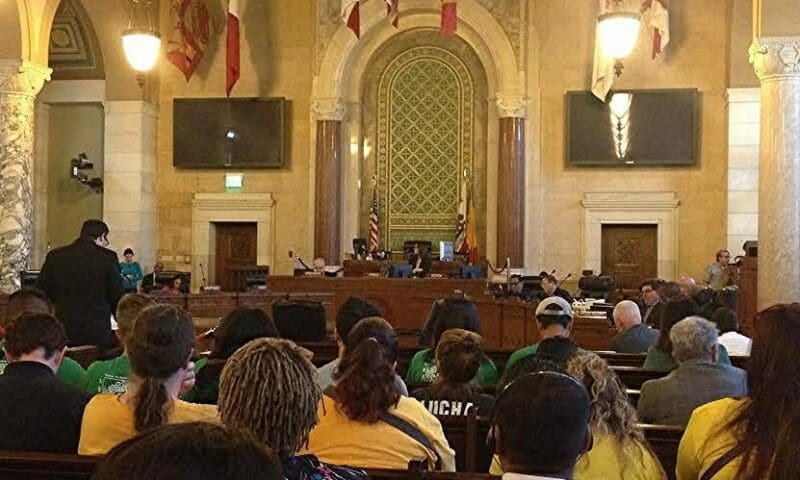
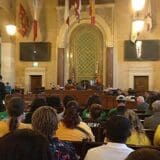
Los Angeles City Council members convened Tuesday for an Economic Development Committee hearing on a motion that would raise the minimum wage for workers in the City of Los Angeles to $13.25 per hour beginning in July 2017, and link future wage hikes to the Consumer Price Index. The motion also calls for an independent study on the economic impact of raising the minimum wage to $15.25 per hour after 2017. Councilmembers further discussed a closely related motion that would focus on the challenge of implementing and enforcing the new wage laws.
Supporters from a variety of local community and labor organizations, each wearing different colored T-shirts, showed up to back the wage increase, including from the Koreatown Immigrant Workers Alliance (KIWA), Alliance of Californians for Community Empowerment (ACCE), L.A. Black Workers Center and Restaurant Opportunities Center Los Angeles (ROC-LA), among others. The hearing, which came just a month after Council members voted to raise the minimum wage to $15.37 for certain hotel workers,
» Read more about: Citywide Wage Hike Gets First Council Hearing »


Night. In this version of the dream, the truck fishtails through the curtain of smoke and flame. Off to the right of her MRAP, the water tanker’s metal skin has split open, sending the liquid treasure everywhere. She watches in stutter shutter clicks as the vehicle’s driver fights to keep that bad boy under control, at the same time zig-zagging past the bombed, burning panel truck.
Corporal Jess Dixon is up top manning the M2 machine gun in the open turret. She swings the weapon about in tight arcs on greased ball bearings, sighting down, wishing for a target as she fires blind. The water tanker hits a slick of burning oil and, brakes screeching, flips, and tons of steel go into a slide. Over her headpiece, not the crackle of her CO, but Whitney Houston singing “It’s Not Right, But It’s Okay.” The armored vehicle clips the tanker, but that ain’t no thing,
» Read more about: The Dixon Family Chronicles: “Early in the Morning” »
If you’re looking for a real fright this Halloween season, there’s no need to find a haunted house or to visit the coffin in your neighbor’s yard. Just take a look at the independent film Plastic Paradise, The Great Pacific Garbage Patch. I saw the film recently with about 200 mostly high school and college students in Santa Monica High School’s Barnum Hall.
It’s hard to know where to start with the grossness of the plastic mass circulating in the world’s ocean gyres (the five swirling oblong currents in the furthest-most reaches of the planet’s oceans). On the Midway Atoll, one of a string of volcanic islands halfway between the U.S. and Japan, tons of old flip-flops, bottles, pacifiers, toys, sippy cups, bottle tops, garbage bags, laundry baskets and every other item of non-destructible plastic origin you can think of, washes up on the formerly pristine,
» Read more about: Film Review: Plastic Paradise, The Great Pacific Garbage Patch »
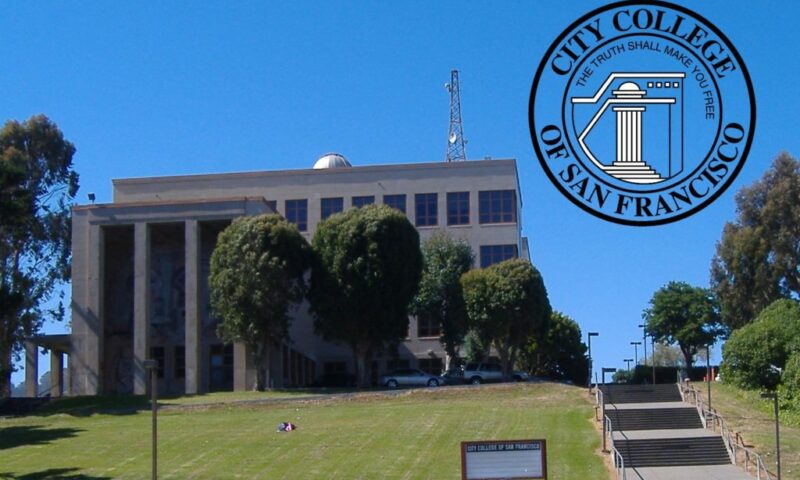

The long-anticipated trial pitting the City of San Francisco against the Accrediting Commission for Community and Junior Colleges — and its efforts to shut down the city’s storied City College — began Monday. The opening statements in San Francisco Superior Court revealed the stark difference in the way the two sides view the role of public education in society.
“This case is about fairness,” Deputy City Attorney Yvonne Mere said in her remarks, explaining that the ACCJC had far overstepped its authority by trying to revoke the school’s accreditation – and in the process deny a college education to nearly 80,000 students, many of whom come from low income backgrounds.
For its defense, ACCJC announced it had to destroy CCSF in order to save it from the ruin of pension health-care costs generated by union contracts with the school. This alarm had first been sounded by ACCJC in 2006, although it had since been muted.
» Read more about: Trial to Save City College of San Francisco Begins »

With Los Angeles Mayor Eric Garcetti and six city council members proposing an increase in the minimum wage, the issue sits firmly on the front burner of L.A. government. Of course the Chamber of Commerce and its allies wring their hands and predict disaster, and some economists are throwing scary statistics back and forth.
Will raising the minimum wage to a livable income raise prices? Probably a bit in some parts of the economy. Will people lose their jobs? Probably a few in some sectors, for a short time. Will the economy grow as a result of poor people having more income to spend? Again, probably. Will life be better for low-wage working families? Undoubtedly.
Minimum wages should provide enough income for working families to put shelter over their heads, food on their tables and clothes on their backs. Employers should pay working people enough to not require government and taxpayers to supply the basic needs of a family.



Readers of Gary Cohn’s coverage of Proposition 47 and Donald Cohen’s report on the privatizing of America’s jails and prisons will be interested in two events held in sequence this weekend.
Saturday, October 25, 9 a.m.-1 p.m. East Los Angeles College, 1301 Avenida Cesar Chavez, Monterey Park. RSVP here
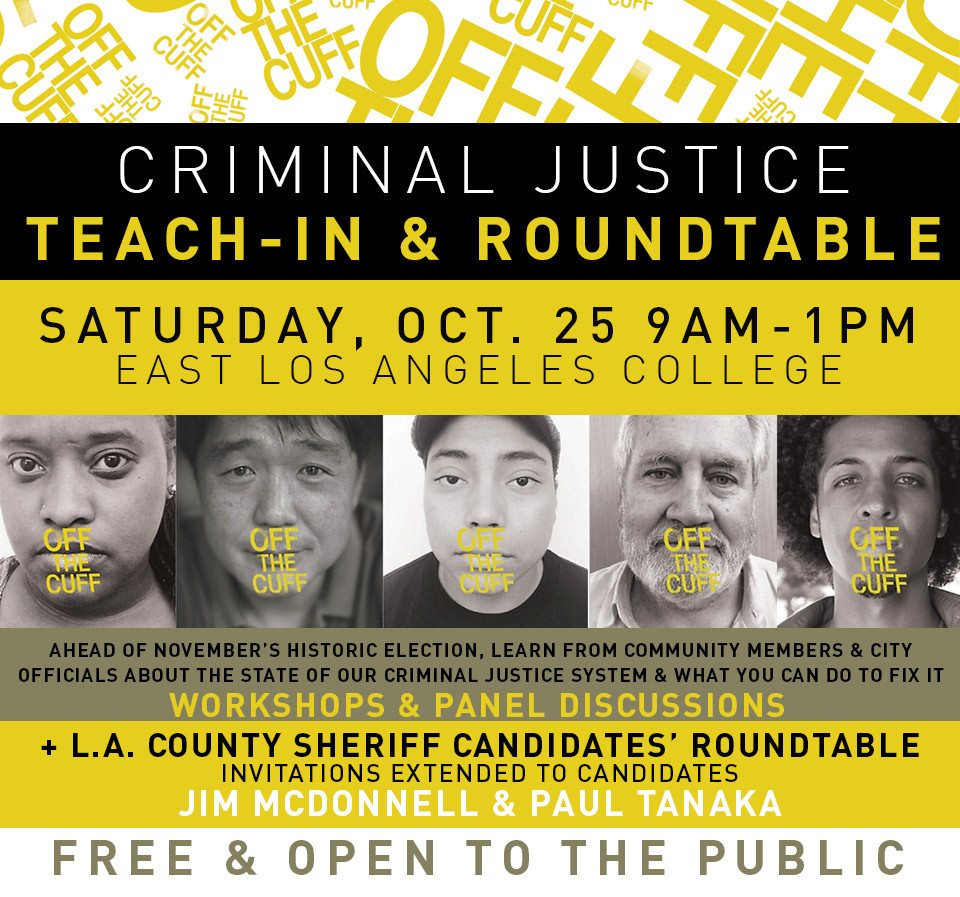



Introducing for-profit companies into America’s criminal justice system has been a bad deal for governments across the country.
During the past several years, a movement opposed to profit incentives in our criminal justice system has grown. Private prison corporations such as Corrections Corporation of America and GEO Group have come under increasing scrutiny and pressure for cutting corners, contracts that include “occupancy guarantees” of 80, 90 and even 100 percent, and unsafe prison conditions.
But it’s not just the prisons that are handed over to CCA or GEO Group. Almost every service delivered inside the prison is being outsourced to for-profit corporations. Outsourced inmate health care, food and commissary services, telephone and financial services like money transfers between families and inmates are all adding to the poor conditions in prisons and burdening inmates and their families with extra costs.
For example, earlier this month, the Palm Beach Post broke the story of the deplorable treatment of prisoners by health care contractors in Florida prisons as contractors seek to maximize profits by cutting costs.
» Read more about: For-Profit Corporations’ Prison Break-in »



Is the Pope a tease? Not really. He’s trying. He challenged the neoliberal economic system just a month into his papacy and brought up one of its difficult byproducts: growing inequality. And last week, at his recently convened synod on the family, he attempted to coax his bishops to expand their definition of the family, acknowledging yet another difficult issue: the rapidly expanding fact of gay marriage. For a brief moment, it appeared the Church was not only poised to liberalize its definition of the family, but it might even be ready to jumpstart Vatican II and go so far as to overturn one of its most cherished catechisms: denial.
It all started with an October 13 press release that included this hopeful language for LGBT Catholics (the draft was credited to a Pope Francis appointee, Monsignor Bruno Forte, a theologian known for his progressivism):
“Homosexuals have gifts and qualities to offer to the Christian community.


When New York rapper Jay-Z played the Rose Bowl last summer, he surprised 90,000 concertgoers by making a political statement. Before launching into his hit “Hard Knock Life (Ghetto Anthem),” he urged fans to vote for a California ballot initiative that would dramatically reduce the state’s prison population and re-direct money into education and treatment programs.
“Prop 47, California! Build more schools, less prisons!” he exhorted.
A few weeks later, two other public figures delivered a similar rap, albeit in a different forum. In a Los Angeles Times op-ed piece, Newt Gingrich, the Republican politician, and B. Wayne Hughes Jr., a conservative Christian businessman, similarly urged Californians to end bloated spending on prisons and reverse tough-on-crime policies that they say have failed to significantly improve public safety. Among other things, Gingrich and Hughes pointed out that California now spends $62,396 per prisoner each year,
» Read more about: Three Strikes Reform: Proposition 47 and the Fight Against Inequality »
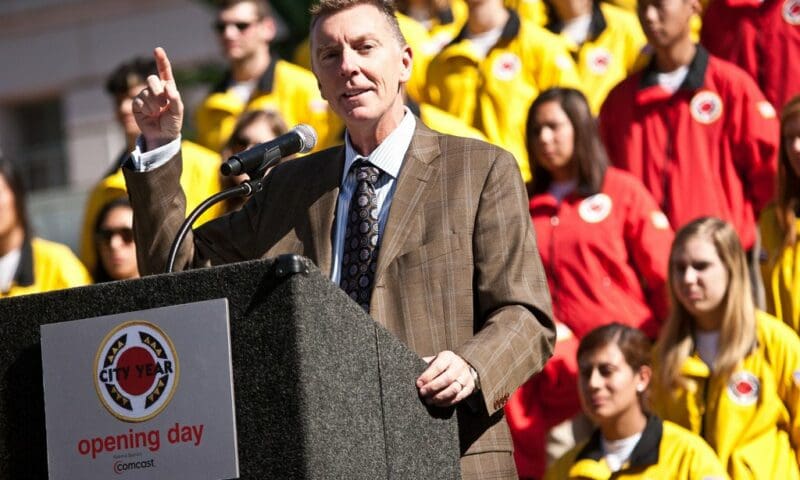


The symbolism of last Friday’s press conference by the recently embattled and newly ex-superintendent of the Los Angeles Unified School District, John Deasy, couldn’t have been more explicit. Speaking for the first time as a private citizen, Deasy spoke to reporters on a conference call hosted by Students Matter.
The Silicon Valley-backed, Menlo Park nonprofit has paid the legal bills for the Vergara lawsuit, which challenged teacher job protections in the state earlier this year by successfully suing the California Department of Education and LAUSD. Deasy became a star witness — for the plaintiffs — when he testified against the state and his own district’s teachers.
For a man who had been brought by L.A. Mayor Antonio Villaraigosa from the Gates Foundation in 2010 to LAUSD as the top deputy to then-superintendent Ramon C.
» Read more about: Mistakes Were Made: The John Deasy Years »
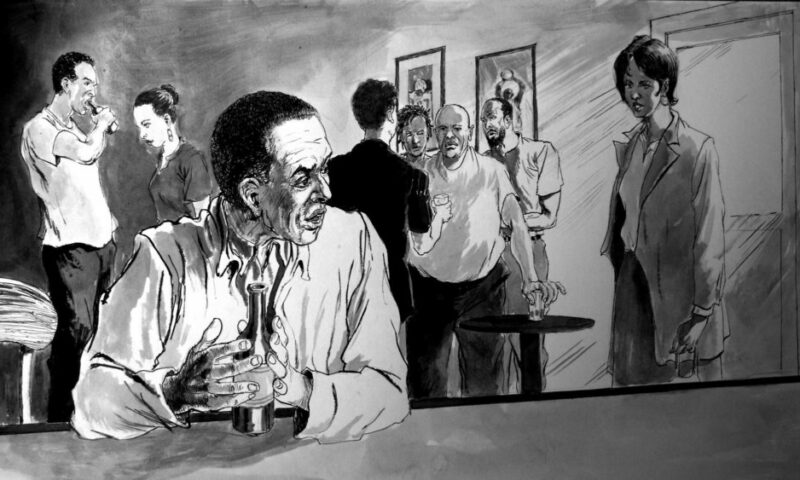

“Son of a . . . ”
Splitting a knuckle open, Jess Dixon grunted through gritted teeth. Working to get the rusted wheel nut loose, it had come undone too fast as she wrenched on the tire iron. Her hand banged onto the edge of the wheel well.
Ignoring the pain, she hurried and got done removing the slashed tire and put the spare on and secured it in place on the hub. The spare was not in good shape, worn smooth on one side, the steel belt underneath just about exposed. She didn’t dig her job but she couldn’t be losing it either.
She got her car going and drove to work, hoping she wouldn’t have a blowout on the lousy tire. Because she got up early each morning, and knew how to change a tire and a few other car repairs from her Uncle Hank showing her,
» Read more about: The Dixon Family Chronicles: “Time Is Tight” »

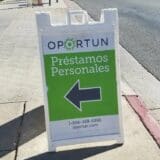

If you watched the Roosevelt series on PBS, as I did, you might have been struck by how Teddy and FDR saw their presidential duties. Both acted on the belief that the role of the federal government was to secure the material wellbeing of the American people. In their eyes the central government had a responsibility for full employment, living wage jobs and reining in the power of corporate America, among other initiatives. They took responsibility for how the national economy impacted the ordinary citizen and saw government action as a vehicle to reverse economic suffering.
Fast forward to the present. We now have a largely paralyzed federal government, consumed in debate over whether or not government action is a curse or a blessing, and unable or unwilling to address the widening income gap. In response, many major American cities are stepping into that pro-active, Roosevelt role; new minimum wage laws have been passed,
» Read more about: The Minimum Wage: A New Deal for Los Angeles Workers? »


 Take the state law on fair competition. Add the Accrediting Commission for Community and Junior Colleges‘ actions to shut down City College of San Francisco (CCSF). What will these ingredients amount to in a court of law?
Take the state law on fair competition. Add the Accrediting Commission for Community and Junior Colleges‘ actions to shut down City College of San Francisco (CCSF). What will these ingredients amount to in a court of law?
That will be determined by San Francisco Superior Court Judge Curtis E.A. Karnow following a non-jury trial that begins October 27. Last year San Francisco City Attorney Dennis Herrera filed a lawsuit on behalf of the people of the state of California (not CCSF) alleging the ACCJC’s evaluation of CCSF was unfair and unlawful under the state law for business competition.
“We have alleged that the ACCJC’s actions, specifically with respect to the evaluation of CCSF, were both unlawful and unfair,” Sara Eisenberg, a San Francisco Deputy City Attorney, told Capital & Main by phone. The ACCJC is subject to California’s Unfair Competition Law which prohibits any business from engaging in unfair,
» Read more about: City College of San Francisco Trial Approaches »



John Deasy is gone. According to City News Service, the Superintendent of Schools for the Los Angeles Unified School District (LAUSD), “submitted his resignation today, ending his three-year tenure as head of the nation’s second-largest school district. Although he is stepping down as superintendent, he will remain with the district on ‘special assignment’ until Dec. 31.”
Deasy’s resignation letter, posted on LAUSD’s website, concludes:
I will transition from this job to another way to serve. In allowing me to do that, I hereby submit my resignation. I will work with your council to close out my employment contract.
In closing, let me thank my critics, for they have helped us see where we can do our work better, and that is what we do with each opportunity to improve. I also wish to thank my supporters. You have enabled us to move quickly to right wrongs in the lives of youth,
» Read more about: School’s Out for LAUSD Superintendent John Deasy »
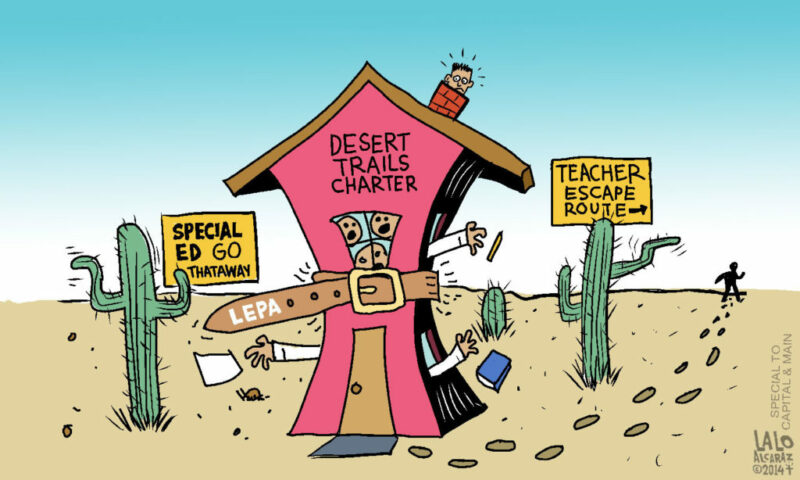

Throughout 2011 and 2012, the eyes of the education world were focused on Adelanto, a small, working class town in California’s High Desert. A war had broken out there over the future of the K-6 Desert Trails Elementary School and its 660 low-income Latino and African-American students. When the dust settled, Desert Trails Elementary was gone. In its place was a bitterly divided community and the Desert Trails Preparatory Academy, the first (and so far, only) school in California and the U.S. to be fully chartered under a Parent Trigger law, which allows a simple majority of a school’s parents to wrest control of a low-performing school from a public school district, and transform it into a charter school.
Tiny Adelanto’s turmoil reflects a much larger battle now being fought across America between defenders of traditional public education and a self-described reform movement whose partisans often favor the privatization and deregulation of education.
» Read more about: Adelanto Report Card: Year Zero of the Parent Trigger Revolution »


Whether or not Parent Trigger represents a bold frontier in the movement to privatize the nation’s public education system, its implementation in California’s High Desert does bear some of the freewheeling aspects of the old Wild West.
Particularly when it comes to accountability and due process. Where do parents or teachers blow the whistle if they suspect a charter school is violating education code or the promises made to students in its own chartering language?
In California, the chartering school district has the statutory authority, and arguably the responsibility, to investigate violations of the law and of the school’s charter. Under Education Code §47607, it may revoke a school’s charter if the school violates the law or violates the conditions set forth in its charter.
Eight former Desert Trails teachers have emphasized to Capital & Main that it was only after frustrated parents told them that Parent Revolution said they were on their own in working out any grievances directly with Desert Trails that the teachers stepped in and took their own allegations of code and charter violations to the school’s chartering authority,


“Am I stutterin’, son?” the green-eyed pleasant-looking man with the perfect teeth said to the tall newcomer standing by his table. Around them the din of the eatery seemed to recede. “There’s no DeMarkus around here.” Like his displeasure, Teaflake made no effort to hide the butt of the Glock sticking out of his waistband.
The young woman sitting with Teaflake smiled understandingly, like she was ushering a patient in for a tooth extraction, Joseph “Little Joe” Dixon reflected.
“Didn’t mean nothing,” he said. “Heard you two was boys is all.” He wasn’t about to back down but wasn’t looking to escalate matters either.
“Who are you?” Teaflake said, his voice low, his enunciation clear and concise, a sharp contrast to the way the usual street hoodlum swallowed vowels and ignored tenses.
Little Joe said, “I’m the new fitness director at Water Stones.” The multi-purpose center was Waterston but everybody called it by its mangled nickname.
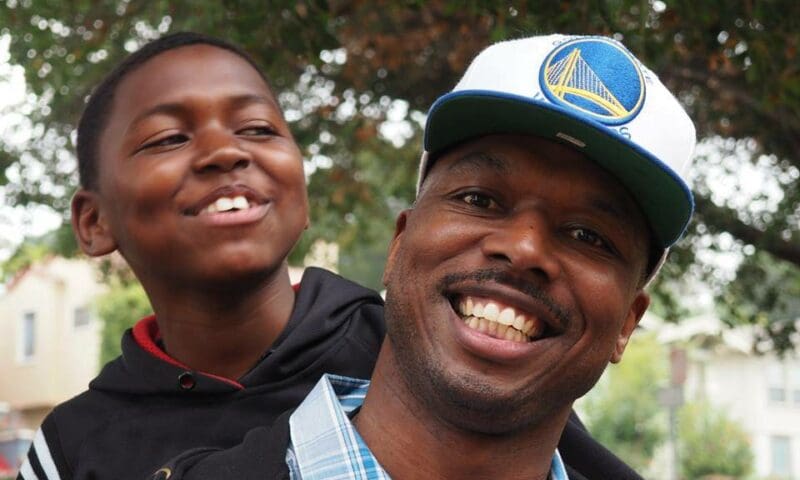

OAKLAND – The growing nationwide movement by cities and counties to raise the minimum wage is currently centered here in the Bay Area, and its success couldn’t be more urgent for workers like John Jones III.
Jones, 40, is a licensed aircraft mechanic but works as a Burger King security guard in downtown Oakland, making $10 an hour — $1 more than California’s minimum wage. His life is a series of financial challenges and daily indignities as he struggles to support his wife D’Nita, his 12-year-old son Kai and his newborn boy, Josiah.
To take a shower in his apartment, Jones has to use pliers to turn on the water because the knobs are broken. He can’t complain to his landlord because he’s behind on the rent. When his family runs out of toilet paper, Jones cuts paper towels into quarters to save a few bucks. He covers the windows in his bedroom with blankets because he can’t afford curtains.
» Read more about: Bay Area Cities Set Sights on Raising Their Minimum Wage »


I’m currently taking an Occidental College class called Community Organizing – a required class for my Urban and Environmental Policy major. We’ve spent the last couple of weeks learning about what it means to bring about change – the planning that needs to go into it, the necessary time commitment, the different levels of power you need to take into account.
To be completely honest, I’m still figuring out whether I consider myself an activist. Am I someone who is engaged in bringing about change? I’m not sure.
That’s when I had the opportunity to interview a modern-day community organizer and change-maker: Pastor Norma Jean Patterson.
She made it clear that life-changing community organizing continues today, and made the historic leaders we talked about in class much more tangible in my mind. In the hour she spoke, she did more than just tell me her story, she moved me to understand the simpler concept underneath all the issues of community organizing: the power of loving people.
» Read more about: Community Organizing: Making it Real, from L.A. to East St. Louis »
Dino Degrassi and Jason Campbell engage in dialogues for a living. They also put the electrical wiring into some of Los Angeles’ largest and most recognizable building projects. Every morning at 6:30 the two electricians ride the street level elevator down into the construction site at Wilshire and Figueroa, where the core of the Wilshire Grand hotel is emerging out of the ground. When finished, the 73-story building will be the tallest west of the Mississippi.
Degrassi is a seasoned journeyman – ostensibly a teacher of apprentices like Campbell who work their way through a five-year program, learning as they go.
Throughout the day, the men’s hard-earned craft knowledge guides their conversation. “I try to help Jason work efficiently,” Degrassi says, as he moves along a cement deck tying in conduit. “I want to make sure he paces himself and doesn’t get hurt.”
“There’s a lot of wisdom to be learned from Dino,
» Read more about: Let’s Talk – Socrates at the Wilshire Grand »